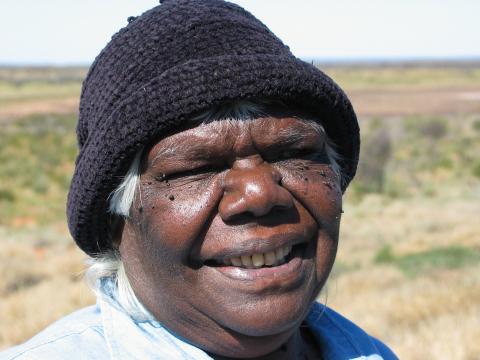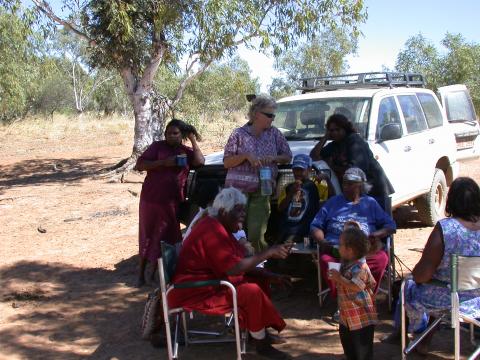Judy Nixon Nakkamarra
My Story
Told by J. Nakkamarra Nixon
I was born here, in Tennant Creek. In 1943 and they just built that hospital. Mum and Dad was staying at the Phillip Creek mission, Mangkamarnta. From there they took me back to the old mission and after, years later, old man my father had a job in Tennant Creek, as a police tracker. So when I was a toddler we came to live in the police station for a while, while he was doing the police tracking job. A few years later we went back to the mission then.
I used to follow Mrs. Graham around. She was staying at the dormitories. Sometimes I used to sneak in there, other times I would just stay with Mum and Dad. There were lots of camps and the east side there used to be the Warlpiri camp, ours was just on the west side, as you go through this other turn off right down that road, we camped there, lived there and just north end there used to be Warlmanpa camp.
My family is the traditional owners for the Mangkamarnta old mission. While we was there my father was the, him and that other Warlpiri elder they were both, they were the two elders there to look after and control the people, there own tribes.
The old people used to have a corroboree for the family events where everybody used to be involved children and women and men together. Every night we used to go and sit down and see the putujli.
The old people always spoke Warumungu to us and in the camps we spoke language. We used to only speak English in the school for the teacher then we’d go back and speak our own language.
The missionaries used to run the place. But they let the old people there. Then later on something went wrong so the Native Affairs took over then. After the years, that’s when the water ran out and the drying up. Then, why they shut the Mission down was because the water was getting scarce then. But years ago, years before that we had flood water, but it didn’t last long. So we had to get water from here, from Seven Mile, telegraph station. Then the contract must have run out so they decided to have meeting now, there finding another place with plenty of water. They looked around and they found it over there, southeast of Wycliff Wells. When they found it, the water, they said alright and shipped all the people from the mission.
And they decided to get that place now. And when they said, “we gotta shift you mob” and “we gotta call it and this name.” Then they called it Warrabri. Why because that name, it represented two languages, Warumungu and Warlpiri so first part was for Warumungu and last part for Warlpiri.
So they shifted all of us, everything, from there to Warrabri then. We lived in a little, lived in a big shed for a little while till they built all the houses. We lived in a big building, a big round one, like a hanger for airplanes.
There was a big mob stayed there. Then after that people started moving into humpies and things, makeshift shelters. Then they started building them tin, aluminium buildings.
We went to school there at Warrabri. I went for my last two years. Maybe two or maybe one, I don’t know. Then, finished school there and started bit of work after school. Like doing things in the shop, you know. They had a little bit of shop there and sewing and things like that for young people, learning young people. Then in 1960 my family and Warumungu people they wanted to come back this way now. Because that’s Kaytaye country, Warrabri. So they was thinking we better not stay on this is not our land we can go back to our country now, Warumungu country. So most of us come back this way then, Tennant Creek. We were all happy to come back too.
First we stayed at the Village, that’s were they came and stayed. Everybody started camping there. And the Native Affairs started building housing for them, aluminium buildings now, they built four there. And in those days me and Mr. Plummer was working at the Native Affairs. The office was in town where that bus depot is, there was a big office there and another office for town, we started working there now. He was a field officer. I was working for the Village, to help all the people in the Village camp, how to look after little families, they own families, send them off to school and all that. Mrs. Graham and DW was doing as homemakers job at Village they had a little office there.
I went on trial first and they kept me on. But when I used to go for that work they never used to take me in a car I used to ride a bike, everyday. I’d go from the town office and see them. Go and sit down with them and tell them tale. They used to cook meals and things for them or teach them how to cook and clean their houses and things.
Then I left the job then cause I was, I got married, then have a baby, Nicko. Then I finished the work then. Then later on in the years, I went lookin’ for another job when he was, my son was about 6, 7, so I went lookin’ for another job and got a job at the school there, primary school, Tennant Creek primary school. I worked as a teaching aid there and went to Batchelor for some training in. I worked there in the school from 1978 to 1983. Then I moved to Kaguru school. It was an open school where you can just sit down on the carpet and do work. So I resigned from the primary school then in 1983 to go to Kagaru. Mostly primary kids up to seven was there.
Then I had a spell with no work, then I got a job at, when they built the Congress then. From 1983 I was training as a health worker now at Batchelor. I became an Aboriginal health worker, registered health worker. We both was doing then together, DW too.
Then I got registered for health worker job there and something went wrong then and we resigned in 1993. I was sitting down for a while, no job. Then they asked me, they had a language centre going at the Mulga there. They asked me if I could help them ya know, temporary job. So I worked with them for a while on trial then when the month came up they asked me then “oh, can you stay on,” so I stayed on as permanent on the job. We stayed on worked there, then later on in the years they put in some submission to buy another building then. Then they bought that building now at Windley Street. So we moved from there together and form that day on, I was working on then, until today.
This is my last year now, from 1993 I worked with them to the years 2004 today. So I’m thinking of retiring now.
Lately I’ve been doing a lot of translating for government work. Cause I can do it with that book to that’s why they want me to come and help now and again. I done all the books now, on bush tucker, bush medicine, and that other booklet for the government agencies, about how to approach Aboriginal people and all that. And then we, I was working with Simpson and all that and we moved. I was a member to for that, when we was talking about setting up a language center, it started at Congress. Old ladies was involved and we got it all right and kept going.
When I was in teacher training we went to Bali, that terrorism wasn’t started yet, that was when I was doing my teacher training course at Batchelor. So we went over to, second trip when we went again we went across Java, right across we met students and all that, Jakarta then we went across to Singapore and flew back. But now can’t do that, it’s too frightening. But that was a good experience
Back then it was better in the olden days, in those days, years. These days it’s to, not good, not the same I mean. Both white and Black, everything has changed.

